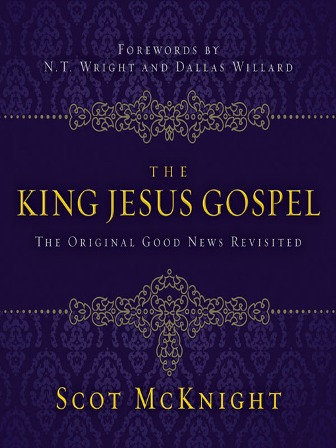 McKnight, S. The King Jesus Gospel: The Original Good News Revisited
McKnight, S. The King Jesus Gospel: The Original Good News Revisited
(Grand Rapids: Zondervan, 2011); 184 pages; ISBN: 978-0-310-49298-6
Have Evangelicals “got the gospel wrong?” Scot McKnight thinks so, arguing with strong language that “Evangelicalism that focuses on decisions [instead of discipleship] short circuits and—yes, the word is appropriate—aborts the design of the gospel” (18). The problem, McKnight contends, is that many Evangelicals equate “gospel” and “salvation” or more particularly, “justification by faith,” and that this reductionist gospel deconstructs the church. “I think we’ve got the gospel wrong, or at least our current understanding is only a pale reflection of the gospel of Jesus and the apostles. We need to go back to the Bible to find the original gospel” (24).
McKnight does just that with two chapters on the apostolic gospel in the letters of Paul and Peter’s preaching in Acts, plus two more chapters on Jesus and the gospel, and the Gospel in the gospels. Using 1 Corinthians 15 as his primary text, McKnight details eight observations of Paul’s gospel, which together comprise the fundamental content of the apostolic gospel. This gospel is the announcement of the story of Jesus as the saving news of God, and as the climax of Israel’s story. The content of the gospel is Jesus, this particular person who is Messiah and Lord, Son and Saviour—King. In light of this content, then, the four gospels are the gospel par excellence, setting forth the story of Jesus and communicating the central features of the apostolic gospel. These central features also show up in the apostolic proclamation recorded in Acts, though McKnight notes two important innovations; first, Paul contextualises his proclamation in gentile contexts with a nuanced account of Jesus as the climax of Israel’s story, and second, gospel proclamation in Acts included a potent summons to repentance, faith and baptism.
McKnight is careful to distinguish the gospel itself from the salvation which flows from the gospel. His argument is that the ancient church extrapolated 1 Corinthians 15 into the rule of faith, and then the creeds. That is, the creeds exegete and expound the apostolic gospel. In the Reformation, however, the focus of faith, theology and preaching became the personal appropriation of and response to the gospel. Although a legitimate development in its context, this led in the post-Reformation period to a truncated gospel in which the gospel was wholly encompassed by this focus.
The singular contribution of the Reformation, in all three directions—Lutheran, Reformed, and Anabaptist—was that the gravity of the gospel was shifted toward human response and personal responsibility and the development of the gospel as speaking into that responsibility (71).
 McKnight argues that the as a result of the Reformation, the gospel story was reframed in terms of the individual and against the church as the mediator of grace. The key innovation in this reframing was the central place given to the doctrine of original sin. McKnight perhaps overstates his case here. The reframing of the gospel through the lens of original sin occurred long before the Reformation. Nevertheless his central point stands: the reframing of the Christian story in terms of original sin and personal justification provided the theological context for the religious individualism which came to full flower in revivalist pietism, and especially so in the American context with its particular individualistic ethos.
McKnight argues that the as a result of the Reformation, the gospel story was reframed in terms of the individual and against the church as the mediator of grace. The key innovation in this reframing was the central place given to the doctrine of original sin. McKnight perhaps overstates his case here. The reframing of the gospel through the lens of original sin occurred long before the Reformation. Nevertheless his central point stands: the reframing of the Christian story in terms of original sin and personal justification provided the theological context for the religious individualism which came to full flower in revivalist pietism, and especially so in the American context with its particular individualistic ethos.
In Evangelicalism, argues McKnight, the gospel has been equated with personal salvation, and proclamation of the gospel with the enumeration of a “Plan of Salvation” in one form or another. This reduction of the gospel to being a story simply of “salvation” has eviscerated the gospel. The heart of his concern becomes apparent in the following paragraphs:
When the plan gets separated from the story, the plan almost always becomes abstract, propositional, logical, rational, and philosophical and, most importantly, de-storified and unbiblical. When we separate the Plan of Salvation from the story, we cut ourselves off the story that identifies us and tells our past and tells our future. We separate ourselves from Jesus and turn the Christian faith into a System of Salvation.
There’s more. We are tempted to turn the story of what God is doing in this world through Israel and Jesus Christ into a story about me and my own personal salvation. In other words, the plan has a way of cutting the story from a story about God and God’s Messiah and God’s people into a story about God and one person—me—and in this the story shifts from Christ and community to individualism (62).
Reducing the gospel to a series of abstract propositions tears us from the story that not only frames the gospel, but is the ground of our identity, vocation, and hope in Christ. It becomes concerned narrowly with personal salvation and morality rather than the lordship of Christ in all of life. As such, it deconstructs the church because there is no inherent or necessary link between a gospel which aims simply at decisions or “conversion,” and discipleship.
What response can be made to these claims? First we need, I think, to recognise the legitimacy of McKnight’s critique where such reductionism is concerned. How prevalent this reductionism is, I cannot say, though I can witness to having seen much of it in the Evangelicalism I have experienced over the last thirty years. Second, what is to be done? The answer to this question is the focus of the final two chapters of the book “Gospeling Today” and “Creating a Gospel Culture,” in which McKnight argues for a robust narrative proclamation of the gospel that sets forth the Lordship of Christ and summons people to respond, so that they may not only be forgiven, but restored to their true humanity and vocation which was defaced and lost in the Fall. The church thus becomes integral to the gospel proclaimed, and salvation a life of following Jesus in the company of God’s people. In all this McKnight does not deny the necessity of personal response and decision with respect to Jesus’ lordship and the work accomplished for us in his death and resurrection. What he does deny is that this decision and response can be abstracted from the overarching story of Scripture and concrete participation in a life of discipleship.
I suggest there is more to be said here about the role of the church in the economy of salvation, especially if the church is no longer to be viewed as a voluntary society. Although the deconstruction of the church was one of his major concerns, McKnight has not developed these points here. Those churches and traditions with a strong ecclesiology, and a covenantal and/or sacramental theology already have the resources to navigate this relation. I suspect that McKnight will be drawn in these directions as he continues to develop his thought in this area.
This is a good and relevant book, addressing an important and probably widespread misunderstanding, and written in a popular and colloquial style for an audience who are unconcerned with academic conventions or critical approaches to Scripture. Its chief virtues are its clear-sighted focus on the issue, its careful delineation between his position and the one he critiques, and its prominent use of Scripture to explore the issues and make its case. I can envisage pastors referring to this text as they help their congregations understand, live and share the gospel.
